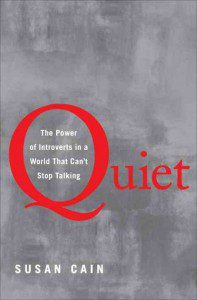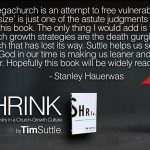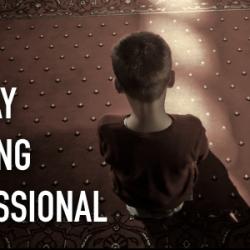 I confess that I finished the book Quiet: The Power of Introverts in a World that Can’t Stop Talking a couple of weeks ago, and have been thinking about it a lot since then. I’m pretty sure this isn’t the last time I will read it. I’m an introvert and this book taught me a lot about myself and about the way I interact with people.
I confess that I finished the book Quiet: The Power of Introverts in a World that Can’t Stop Talking a couple of weeks ago, and have been thinking about it a lot since then. I’m pretty sure this isn’t the last time I will read it. I’m an introvert and this book taught me a lot about myself and about the way I interact with people.
I confess that this book made me more aware of the deference we show toward extroverts as a culture. Over the past few weeks I’ve noticed how much people talk in order to impose their will on a situation, instead of just sharing ideas. Extroverts and highly opinionated people are prone to this behavior because they are used to getting their way. Cain’s research shows that extroverts and highly opinionated people dominate decision making in groups, solely because their ideas get the most airtime, and we sense that forceful personality is synonymous with conviction.
Yet, while dominating a conversation might allow an extroverted person to get their way, this bears little correlation to a group’s ability to make the right decisions. Cain says, “There’s zero correlation between being the best talker and having the best ideas.” She cites research into the 2008 financial collapse suggesting that the in nearly every firm taking on risky sub-prime mortgage bundles, there was an introvert at the table saying it was a bad idea. They were unilaterally ignored.
I confess that so far this books is doing a few things to me. First, I’m trying to be more comfortable with stretches of silence in group settings, asking more questions, attempting to repeat back what I hear to make sure I get it. I’m also attempting to make sure I’ve listened to the quiet people in the group. When someone is quiet, I try to make sure I’ve heard their side. I’ve also been reminded of how much better one on one interaction can be for an introvert.
I confess that I’m also learning that most introverts will find ways to become functionally extroverted in service of things they love, or causes they care about deeply.
Here’s a partial list of a few interesting things I learned:
- introversion is connected to high-sensitivity & a preference for environments that are not over-stimulating
- introverts have such an active and rich inner life that they are hardly ever bored
- the bias toward extroversion is a cultural phenomenon that is not universal
- personality has replaced character as the standard personal virtue in our culture
- far too much talent, far too many ideas are over looked due to introversion
- the higher up you go in leading an organization, the more important introversion becomes
- introverts like to do our small talk at the end of a conversation
- evangelicalism has taken the extrovert ideal to the extreme
- education is highly biased to reward extroversion
- we have two ears and one mouth and should probably use them proportionally
- introverts love parties, but like to pair off and have a deeper conversation
- the difference between introversion and shyness is important
- schmoozing ability is too often confused with talent.
I confess I’ve also begun to notice how little time we spend actually listening to one another, asking clarifying questions, seeking to make sure we understand, and then not offering our own opinion. We nearly always offer our own opinion. We are slaves to self-expression (he said, while writing private confessions on a public blog). I’m reminded of St. Francis’ prayer:
Grant that I may not so much seek
to be consoled as to console;
to be understood as to understand;
to be loved as to love.
For it is in giving that we receive;
It is in pardoning that we are pardoned;
And it is in dying that we are born to eternal life
After reading Cain’s book, it seems pretty obvious to me that I’m an introvert. That I chose occupations like lead singer in a band, worship leader, or teaching pastor seems evidence that I felt like I had something to contribute, but struggled finding appropriate and helpful ways to do so. Those roles offered me the opportunity to have the stage without having to shout. Those roles also allow me to carefully prepare in advance for what is always a somewhat over-stimulating environment. I turns out that this is quite common for introverted personalities.
I confess that I am tempted to overlook the small things. I confess that I can hardly think of anything truly important that would not be improved if we spent more time developing our character, and less time developing our personality.
Okay, that’s my confession for a Monday… your turn:











